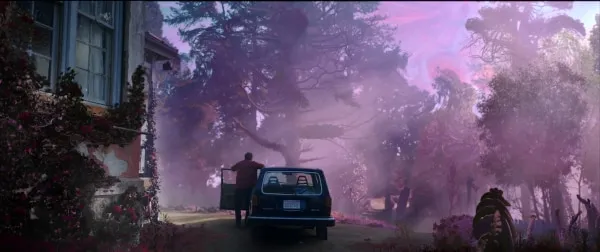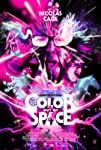Eye For Film >> Movies >> Color Out Of Space (2019) Film Review
Color Out Of Space
Reviewed by: Jennie Kermode

How does one film the unfilmable? Though he frequently endeavoured to describe the indescribable, HP Lovecraft left a difficult legacy for filmmakers because much of what he wrote depended heavily on provoking the imagination of the reader, encouraging the mind to grasp at concepts which, being barely understood, loomed large in their alienness, producing a potent sense of dislocation or fear. Of all his works, this tale of a different colour - some barely perceptible yet nonetheless dangerous menace from beyond the Earth - is the most challenging to capture onscreen. Several filmmakers have tried. To date, the most successful depiction was probably that in 2017's The Endless, which approached it in a sidelong manner. Richard Stanley's take is more straightforward, a simple update of the original story, and though it struggles in the same manner as it predecessors it does succeed in the difficult task of connecting the author's existential horror theme with the dynamic of a modern, accessible horror film.
One of the most touching things about the original - something it shares with another Lovecraft ale, The Dunwich Horror, which was part of the inspiration behind the recent Castle Freak remake - is the way it explores the lives of people frequently outside the scope of American literature; the backwoods farming folk barely able to eke out a living from their land, semi-literate, superstitious and frequently treated with contempt by the mainstream. These are communities which in, in 2016, would have voted for Donald Trump and been regarded with incomprehension by Democrat politicians who never noticed they were there before. Lovecraft doesn't flatter them but he does show sympathy for their plight, and never more so than in The Color Out Of Space. Here, however, the simple homesteaders of the story have been replaced by a family which has recently moved out of the city in search of a better life. The reason for this substitution is unclear. Did the producers feel that most viewers would find these people easier to identify with? Did Stanley want to demonstrate that no amount of sophistication can protect against the kind of mental and physical deterioration that the Color causes? There's a poignancy about this shift, a suggestion that encroaching modernity has been every bit as dangerous to those humble folk as the alien presence itself.

What is the Color? It arrives one night in the form of a meteorite, startling parents, siblings, horse and dog - then melts away by morning, but not without leaving a sinister trace of something in the well. Father Nathan (Nicolas Cage) is already somewhat unsettled, worried about another intruder into his quiet rural space, a young black environmental researcher (Elliot Knight) who has caught the eye of his gothy teenage daughter Lavinia (Madeleine Arthur). When something starts to go wrong with his wife's health, he begins to sense just how precarious life in such a remote place can be, unable to care for her and the family's alpacas and the children all at the same time. Lavinia's little brother starts spending hours at a time staring at the well, talking as f to an invisible friend. And that's just the start of it.
Despite the reframing and the presence of Knight's character, most of Stanley's version sticks remarkably close to the original. Written in 1927, the same year that radiation sickness was formally identified, this has sometimes been interpreted as a prescient take on that phenomenon, and the initial symptoms Stanley presents to us fit both the novel and a depiction of that sickness as we understand it today, though he goes on to introduce elements of body horror with echo Stuart Gordon's takes on the author's work whilst lacking their playful character. The mood here is increasingly grim, suffused with the despair of people who don't understand what is happening to them partly because of what is happening to them. This isn't an easy sell to a cinema audience - who wants to spend two hours being made to feel hopeless and miserable? - but it's powerful nonetheless, and impressively handled. Though clearly delighted to have a role in a story he loves, Cage is restrained, careful. It's not clear exactly when the doting Nathan shifts into somebody who might be a danger to those around him - but here Stanley draws in a different kind of horror (also hinted at by Lovecraft) and it's one whose development people too often miss in real life.
If there's one thing that the film might have done significantly better, it's to make the presentation of the Color itself subtler. We see too much of it too early and too vividly to develop a proper sense that there is a lurking threat. Stanley isn't the first director to represent it using purple light (arguably an appropriate choice as it's rarely found in nature) but bright as it is, this gives the film too obvious a monster. Alongside the more sophisticated aspects of the narrative it seems tacky and struggles to invoke fear.
Though we are still far from having a definitive cinematic version of The Color Out Of Space, Stanley's film has a lot going for it and will certainly interest fans. Other viewers - as long as they can stomach the body horror element - are likely to find it an intriguing curiosity. It's difficult to get a handle on but in that regard, at least, it's doing something right.
Reviewed on: 22 Dec 2020
















